Five North Shore businesses that keep improving with age.
For people, age can be a touchy subject, but for a business, old age is a quality to advertise. In consumers’ eyes, the more “years of experience,” the more reliable the service, the more reputable the provider. Local communities prefer longevity as well: Established companies give back via donations and sponsorships, they boost tourism, and they even help shape an entire region’s personality.
The following five companies are over 50 years old (some well over) and are commercial icons of the North Shore. Although industries differ, they have a few key things in common—a sense of history that permeates their operations and an ability to morph with the times without losing sight of core values.
Gorton’s Seafood
Since 1849
|
Everyone knows the jingle and has probably eaten a fish stick or two. Gorton’s is a freezer aisle fixture—the company’s fish sticks and fried fish fillets are staples for many a family.
Gorton’s walks the walk with a 150-plus- year-old past tied to the fishing industry. The company was originally founded by a father-son duo in 1849 under the name John Pew & Sons. This small precursor eventually merged with Slade Gorton’s Rockport-based fishing business and two other Gloucester fisheries in 1906 to create Gorton-Pew Fisheries. In light of the merger, the expanded company opened offices on Rogers Street in Gloucester, where the main office is still located today.
“Many folks know us as ‘Gorton’s of Gloucester,’ ” says CEO Judson Reis. “We’ve been fortunate to have the same beautiful view of Gloucester Harbor from our main office across the street for over a century—with some structural updates, of course.”
Interestingly, Gorton’s was the first to develop a frozen convenience food— fried codfish fillets—but has focused recently on healthier options such as gluten-free grilled fish and “artisan” fillets with bold-flavored breadcrumbs. Not surprisingly, the trademark fish sticks and fillets “remain some of our most loved and best-selling items,” notes Reis.
Recently, the multimillion-dollar company turned its attention toward sustainability. “It’s become a priority for us,” says the CEO. “Over the past five years, we’ve implemented world- class sustainability practices under our ‘Trusted Catch’ platform and moved from sourcing 64 percent of our wild- caught seafood from certified fisheries to 97 percent in 2013.”
“There is still a lot of work to do on this sustainability journey,” asserts Reis. “But as the leading seafood brand in America, we view it as our responsibility to help create change and to ensure that generations to come can enjoy a great variety of delicious seafood.” gortons.com
The White Elephant Shop
Since 1952
|
The White Elephant has been in continuous operation on Main Street, Essex, since 1952. In the 1980s, just a couple miles down the street, Rick Grobe and his wife Jean purchased a residential property with the goal of turning its old barn into a house. When Grobe heard the White Elephant was for sale, he jumped at the chance and has continued the shop’s legacy since the takeover in 1985.
No stranger to retail, Grobe grew up working in his parents’ shop on Route 6A in Yarmouth Port. Then, at the age of 26, he took a leap and moved the store into Boston’s Faneuil Hall. “We were open every day except Thanksgiving and Christmas—that’s how I got my education in retail,” he relates.
By the time Grobe came along, the White Elephant Shop’s reputation was already well established. “It’s a name that people remember. People call us all the time to sell; the business is like its own natural spring.
“That’s what people like about us,” he continues. “Our inventory comes fresh out of houses on Cape Ann.”
Grobe is often on the road “picking” from cellars, attics, barns, and entire estates, and his clientele includes collectors, designers, and even other antique dealers. Customers in the know take advantage of the outlet shop down the street: “It’s sort of like an ongoing yard sale; people love it,” he says.
But not every year was smooth sailing: in 1991, an electrical fire burned most of the shop to the ground. Initially disheartened, Grobe was able to find a silver lining and rebuilt with a much more convenient layout. “It’s a fun business for me, and the customers have been fantastic,” says the shop owner. You always remember when you get a bargain, and that’s the magic of the White Elephant Shop.” whiteelephantshop.com
Woodman’s of Essex
Since 1914
|
Woodman’s is currently celebrating its 100th anniversary, and in the past century has grown from a roadside stand to a North Shore institution. “It’s quite an accomplishment,” says Stephen Woodman, who shares the CEO title and responsibilities with his brother, Doug. “It wouldn’t have happened without our loyal customers and our amazing staff.”
The company’s founder, Lawrence “Chubby” Woodman, was an avid fisherman. “He loved the river; he was always in his boat,” recalls Stephen of his grand- father. “I remember when he first taught me how to clam. I swung the rake down and ended up with a fork in my boot— luckily it went between my toes.”
As the story goes, Chubby and his wife Bessie opened a roadside concession stand on Main Street, Essex, in 1914. At first, business was slow but on the recommendation of a passing fisherman, Chubby made a leap of faith and tried frying a clam. After some experimentation, the fried clam was born and was an instant hit.
Appropriately enough, “Chubby’s original fried clams” are at the top of the current menu. Second only to fried clams in popularity is the restaurant’s fresh lobster, casually boiled on the sidewalk in big pots. The catering division is known for clambakes and barbeques but is expanding with more traditional menus.
Thanks to its down-home, paper plate atmosphere, Woodman’s is the quintessential seafood shack. Over the years, it has hosted celebrities, sports stars, and even film crews: A Grown Ups movie scene was shot inside the restaurant and a Larry David HBO special was filmed in one of its function rooms.
Even with all its expansion, the seafood legend still remains a tight-knit family business. “We’re on our fifth generation,” says Stephen, “but what’s great is that we have customers who remember when I was crawling around here in diapers. They keep coming back for the quality and the tradition.”
Giblees Menswear
Since 1945
|
The patriarch of Giblees Menswear, Joseph Gibeley, did a variety of odd jobs as a young kid, but his favorites were shining shoes and cleaning hats. In the late 1950s, he opened a hat shop on Washington Street in Salem. He was in his early twenties.
The company’s quirky name was spawned by Joseph as well: He originally hung a “Gibeley’s” sign over the Washington Street entrance but noticed that clients sometimes bumped their heads on the “Y,” so he exchanged it for an “E” and dropped the apostrophe in the name of customer satisfaction.
When the popularity of hats began to fade, the store broadened its merchandise to include menswear. Joseph’s sons, Albert and Robert (Bob), took an active role in this expansion. In the early 1970s, under Bob’s leadership, Giblees opened a location in Danvers’ Liberty Tree Mall, where the store remained for over 25 years.
With vacancies on the rise, the Gibeleys decided to leave the mall for fast-developing Route 114. After trying out different locations, they purchased their current building with enough space for the main store as well as a full- service tux department. Although Bob, 80, officially retired in 2011, he still makes daily appearances while his son, Alan, officially manages the store.
Customers are drawn to Giblees for its quality apparel, which ranges from casual sportswear to imported Italian labels to custom-tailored suits. But its espresso bar, pool table, and multiple flat-screen TVs sweeten the deal.
“We value our clients,” says Alan of the company’s unbending service-oriented philosophy. “They are hard to come by, but once we have them, we keep them for life.” giblees.com
Landry & Arcari Oriental Rugs & Carpeting
Since 1938
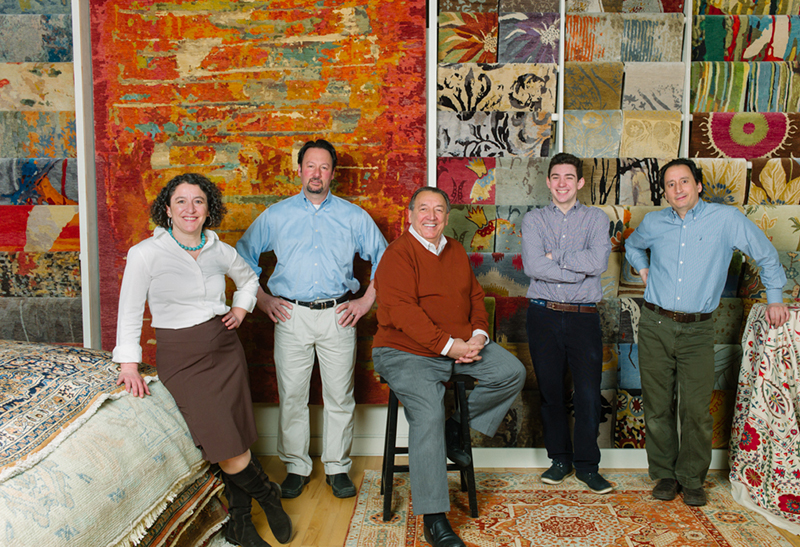 The Arcari family, left to right, Julie, Jay, Jerry, Ben, and Jeff The Arcari family, left to right, Julie, Jay, Jerry, Ben, and Jeff |
Walking into Landry & Arcari equals total rug immersion. The Salem and Boston showrooms combined stock of 9,000 rugs are displayed on floors, grouped in piles, and draped on walls. The options are dizzying and, for interior design buffs, intoxicating.
Owner Jerry Arcari is an Oriental rugs aficionado. He’s apprenticed with an expert from Beirut, and has traveled extensively, learning from and connecting with village weavers. He also paid his dues while working as a rug buyer for Jordan Marsh’s Peabody store, where he started in sales right after high school in the late 1950s.
When Jerry and his wife Connie heard that George and Charles Landry were retiring, they acquired the brothers’ 40-plus-year-old company, Landry Brothers Upholstery Furniture, in 1981. The combination of the Landrys’ strong customer base (the brothers stayed on for a year after the purchase, hence the combo name Landry & Arcari) and Jerry’s Jordan Marsh clientele made for a strong beginning. Since then, “business has flown,” says Jerry.
“A rug is a work of art: The whole process is fascinating, from the shearing and the spinning of the wool, to the dying, to the creation of a template that is brought to life on a loom,” he says. The entrepreneur counts himself lucky to have experienced a renaissance in the rug industry. “Customers today are so much more knowledgeable, more artistic, and more color sensitive than when I first started,” he relates.
Under the leadership of his three children—Julie is CEO, Jeff oversees the Oriental rug division, and Jay manages the broadloom carpeting—Landry & Arcari continues to expand. “The cherry on the frosting of the cake is being able to flip rugs with my grandson in the Boston store on week- ends,” says Jerry. “It’s been a trip and a half, and I would do it all over again.” landryandarcari.com
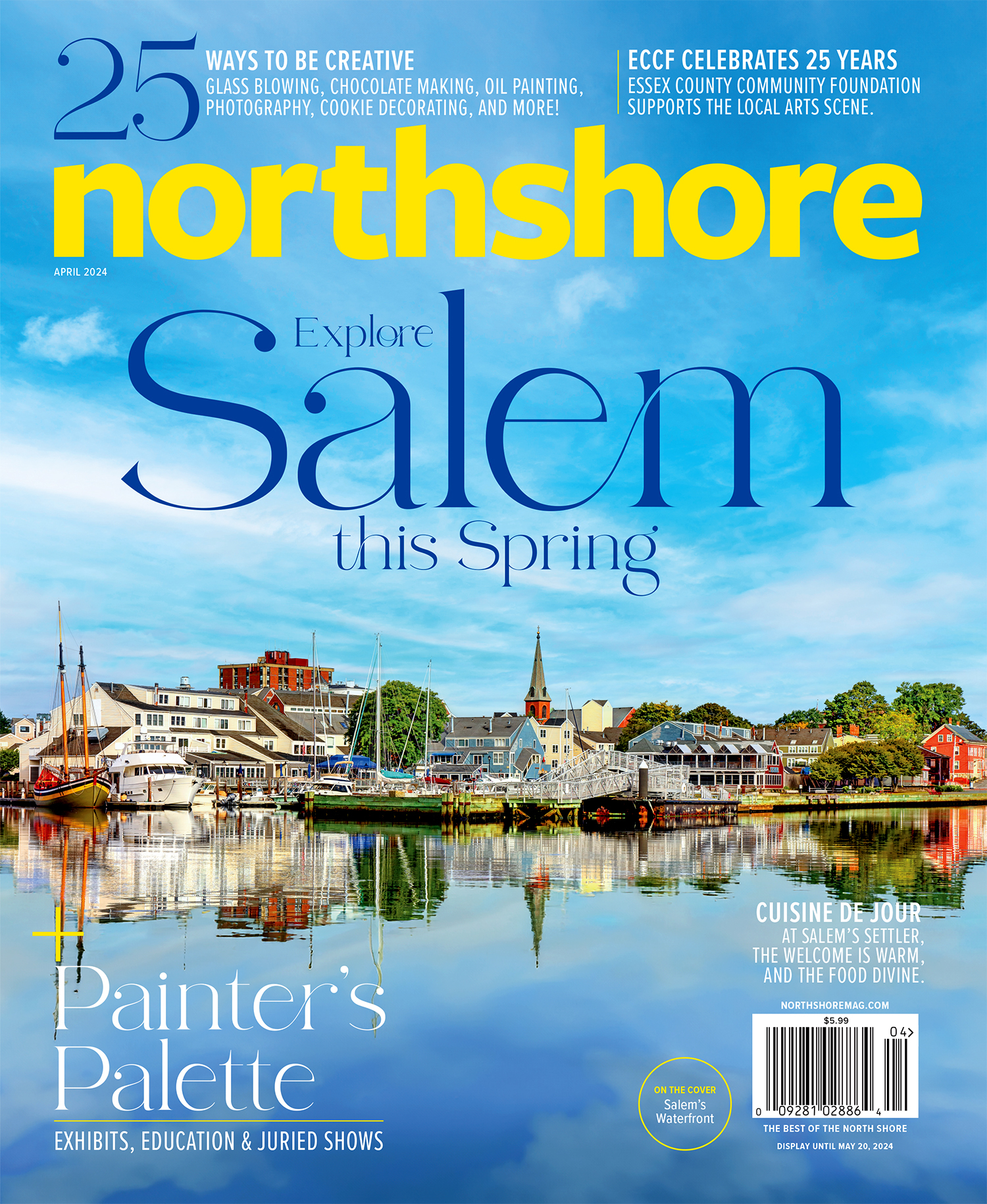

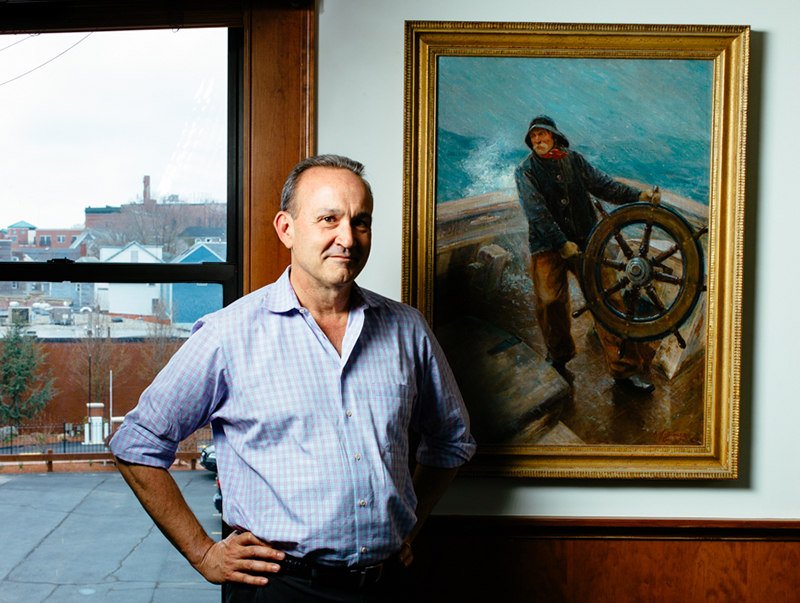 Gorton’s CEO Judson Reis
Gorton’s CEO Judson Reis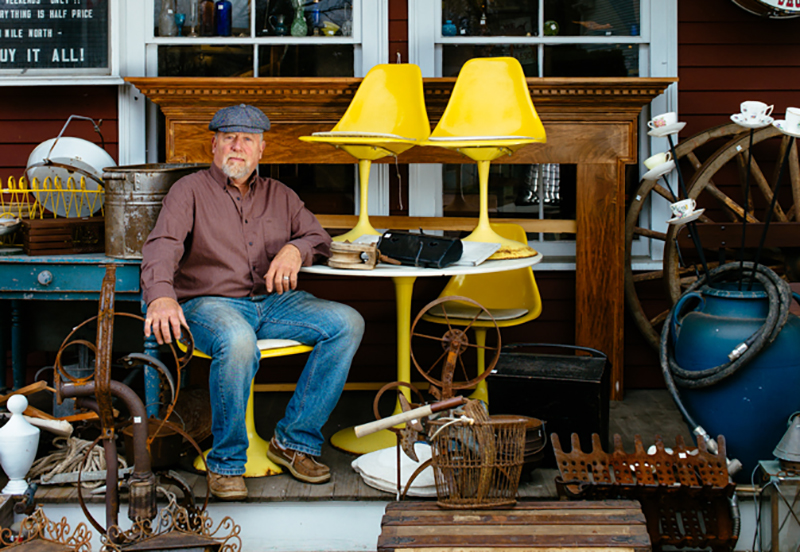 Rick Grobe of The White Elephant Shop
Rick Grobe of The White Elephant Shop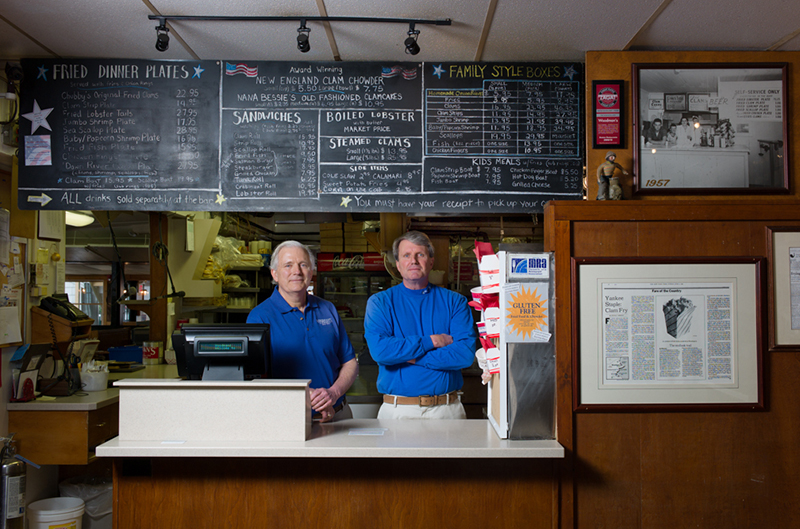 Stephen and Doug Woodman are the fifth generation of Woodmans to feed the North Shore’s clam lovers
Stephen and Doug Woodman are the fifth generation of Woodmans to feed the North Shore’s clam lovers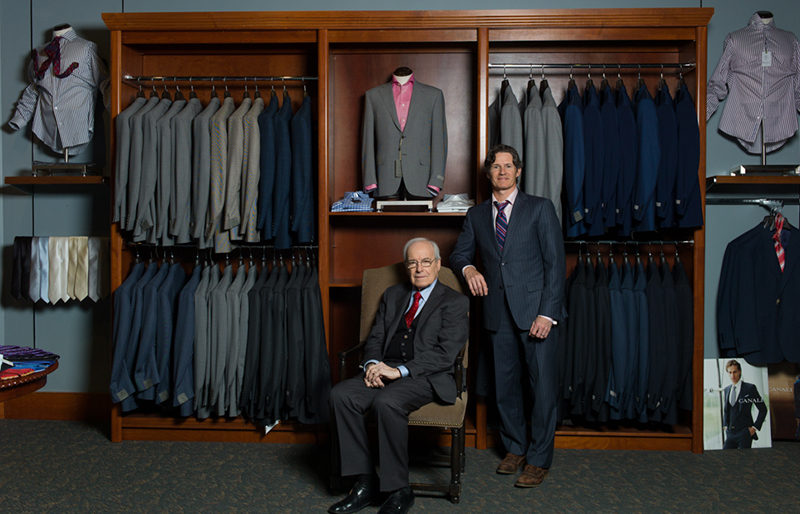 Robert and Alan Gibeley
Robert and Alan Gibeley